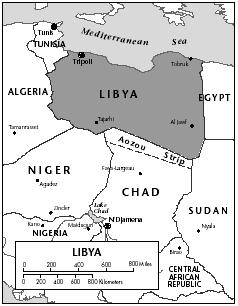Libya - Leadership
In September 1999, Qadhafi celebrated 30 years as the head of the Libyan government. Commentators have described Qadhafi's policies during these years in power as "revolutionary," "idiosyncratic," and "confused." Qadhafi's first years in power were remarkable for his persistent, if unsuccessful, attempts to bring about the union of Libya with other Arab countries, notably Egypt, Syria, and Tunisia, among others. All of these attempts, however, remained fruitless, despite Qadhafi's enthusiasm for union.
Failing to achieve the hoped-for political mergers, Qadhafi adopted a new course, that of natural socialism. In May 1973, he presented his political philosophy in his Third International Theory, an alternative to "capitalist materialism and communist atheism." His principles comprised an unusual blend of Islamic fundamentalism and socialism, the application of which went through several phases. The first, between 1969 and 1973, was characterized by the twin process of nationalization and Libyanization. Subsidiaries of international oil companies operating in Libya were

nationalized, branches of foreign banks were put in Libyan hands, and foreign property was taken over by the state.
During the second phase, 1973 to 1975, Qadhafi concentrated on building a power base for his regime by redistributing some of the country's oil wealth among the largest possible number of Libyans and providing them with much-needed social services. Industry received a big boost, and many new plants and factories were opened between 1973 and 1975.
The Green Book, meanwhile, of which the first volume, The Solution to the Problem of Democracy, had appeared in 1976, heralded more drastic economic policies. Workers were encouraged to take over and administer industrial and commercial enterprises. Tenants became owners of their homes, paying mortgages to the state rather than rent to the landlords. Public corporations replaced the private sector in foreign trade, and large government cooperatives became substitutes for small retail traders.
On 2 March 1979, Qadhafi, stressing the need to separate the state apparatus from revolutionary action, claimed to abandon all official posts, remaining only the "leader, theoretician, and symbol" of the revolution. The people would henceforth "exercise and consolidate all power" in conformity with direct democracy as defined in The Green Book.
The phase between 1980 and 1987 was a very difficult one for the Libyan leader. The fall in oil prices and the imposition of economic sanctions on Libya by the United States and other Western powers for his alleged involvement with international terrorist groups further eroded Libya's economy. The country sank into debt, froze or cancelled many of its industrial and housing projects, and by the mid-1980s resorted to expelling tens of thousands of foreign workers, whom it could no longer employ or pay. Black-marketeering flourished as Libyans found ways to circumvent the state's Draconian economic measures. The smuggling of subsidized products—such as rice, oil, and tea—from Libya to neighboring states where they were sold for higher prices further exacerbated existing shortages.
By 1988, Qadhafi had to face the fact that his policies had failed. They had led neither to the development of the economy nor to the creation of a political base for the regime. There was strong opposition to his policies at all levels of society, and the 1980s witnessed more attempts at overthrowing him than at any other time to that point. To survive politically Qadhafi began to change course. In 1988– 89, he freed a number of political prisoners and invited members of the Libyan opposition living abroad to come home, promising to return their confiscated property. Shopkeepers were also gradually allowed to open up their stores and sell their products on the market.
In the 1990s Qadhafi faced continued coup attempts. There was growing unrest in the armed forces, his long-solid tribal support began to wane, and militant Islamists gained popularity among small segments of the population. Additionally, British and American investigators of the 1998 airline bombing of a Pan Am flight over Lockerbie, Scotland, led to the indictment of two senior members of Libya's intelligence services. Qadhafi refused to extradite them, even in the face of two separate UN resolutions (passed in 1992 and 1993) demanding that he do so, and also imposing international sanctions on his regime. The United States placed further economic sanctions on the country. After several years of worsening economic conditions, many members of the international community, primarily Arab and African nations, began pleading for a relaxation of the sanctions, but the United States and the UN insisted that they would remain in place until Qadhafi handed over the indicted intelligence operatives. In August 1998, Qadhafi finally agreed to hand over the suspects, who were then tried in a special court set up in The Hague under Scottish jurisdiction. (One of the men was convicted and the other acquitted). Sanctions were suspended after the men's extradition and international investment began pouring into the country.
Comment about this article, ask questions, or add new information about this topic: